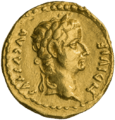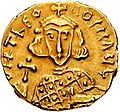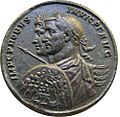Augustus (honorific) facts for kids
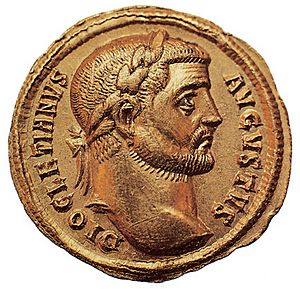
Augustus (say: aw-GUS-tus) was a very important title in Ancient Rome. It means "majestic," "the increaser," or "venerable" in Latin.
The first person to use this title was Gaius Octavius, who became Rome's first Emperor. After he died, "Augustus" became an official title for all future Roman emperors.
There was also a female version of the title, Augusta. This was used for Roman empresses and other important women in the Imperial family.
Both "Augustus" and "Augusta" were first used in the time of the Roman Republic. They were connected to things that Romans thought were divine or sacred in their traditional religion. Using these titles for the emperors and their families helped link them to Roman values and the idea of divine will. This was part of the Roman Imperial cult, which was like a special worship of the emperor.
In the parts of the Roman Empire where Greek was spoken, "Augustus" was often translated as sebastos (say: seh-BAS-tos), meaning "venerable." Sometimes, it was just made to sound Greek, like augoustos (say: ow-GOO-stos).
After the Roman Empire ended, "Augustus" was sometimes used as a name for important men, especially in the lands of the Holy Roman Empire. It is still a given name for boys today.
Contents
Becoming Augustus
The first true Roman Emperor to be called "Augustus" was Gaius Julius Caesar Octavianus, also known as Octavian. He was the adopted son of Julius Caesar. Julius Caesar had been killed because some people thought he wanted to be a king. After his death, Julius Caesar was officially declared a god.
Octavian was careful not to seem like he wanted to be a king. But his position was very special. He had ended Rome's long and bloody civil war by winning a big battle at Actium. He brought lasting peace to Rome. People believed the gods clearly favored him.
Octavian held many important roles:
- He was the princeps senatus, meaning the "first man" or leader of the Senate.
- He was pontifex maximus, the chief priest of Rome's state religion.
- He had imperium, which gave him authority like the chief executive and made him the supreme commander of all Roman legions (armies).
- He also had tribunicia potestas, or "tribunician power." This meant he was protected from harm (sacrosanctitas) and could stop any law or proposal by any other official in Rome.
The Roman Senate officially renamed him Augustus on January 16, 27 BC. Some say he might have chosen the name himself. He had thought about "Romulus" (after Rome's founder) but decided against it. The name "Augustus" was linked to old Roman religious ideas but was new as a personal title. It showed that he had the approval of Rome and its gods, and that he had unique, special talents. His full official title was Imperator Caesar Divi Filius Augustus. This meant "Commander Caesar, Son of the Deified One, Augustus."
The title "Augustus" was then used by all the emperors who came after him.
Augusta: The Female Title
Augusta was the female version of Augustus. It also had religious connections. This title was given to some women in the Imperial families. It showed their power and influence, and sometimes suggested they were almost divine. It was the highest honor a woman could receive.
The title "Augusta" was also given to Roman goddesses who were linked to the emperor's generosity and care, like Ceres, Bona Dea, Juno, Minerva, and Ops. Other ideas that were seen as female, like Pax (peace) and Victoria (victory), were also called Augusta.
The first woman to receive the title Augusta was Livia Drusilla. She was the wife of Emperor Augustus. He gave her this honor in his will. After his death in 14 AD, she was known as Julia Augusta until she died in 29 AD.
Dividing the Empire
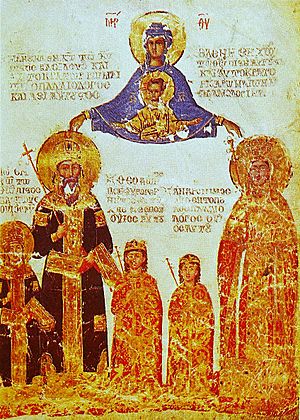
Later, under an emperor named Diocletian, the Roman Empire was split into Eastern and Western halves. This system was called the Tetrarchy. Each half was ruled by a senior emperor, who had the rank of augustus. Below him was a junior emperor, who was called a caesar.
In the Greek-speaking parts of the empire, the titles were translated:
- Imperator became autokratōr
- Caesar became kaisar
- Augustus became augoustos or sebastos
These Greek titles were used in the Byzantine Empire (the Eastern Roman Empire) until it ended in 1453.
The last Roman Emperor to rule in the West was Romulus Augustus. He was sometimes called Augustulus, which means "little Augustus." This was because his reign was not very important.
Legacy of the Title
The Latin title for the Holy Roman Emperor was usually "Imperator Augustus." This is where our modern idea of an "emperor" as the ruler of an empire comes from. The name Augustus is still used as a given name today.
Images for kids
-
A coin of emperor Tiberius marked tiberius augustus
-
A worn coin of emperor Theodosius III marked dn theodosius aug
-
A coin of the late 3rd century emperor Probus, showing abbreviated titles and honorifics - IMP·C·PROBUS·INVIC·P·F·AUG
See also
 In Spanish: Augusto (título) para niños
In Spanish: Augusto (título) para niños
 | Bessie Coleman |
 | Spann Watson |
 | Jill E. Brown |
 | Sherman W. White |


